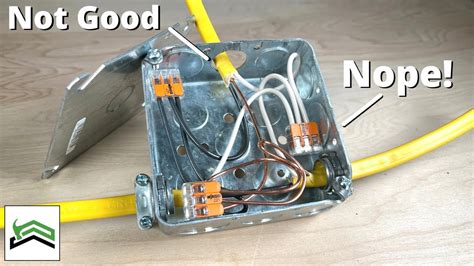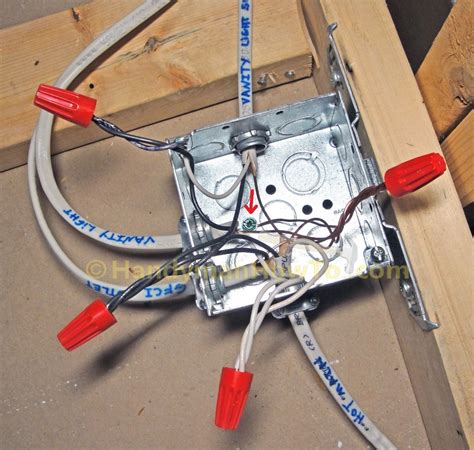electric connection wire hold to box It's also a simple, approved solution for extending an electrical circuit since the National Electrical Code (NEC) dictates that no wiring splices are allowed outside an approved . If it's really that bad it's probably better to strip the drywall off and start over. Might be a good excuse to upgrade the service while you're at it, and you'll have peace of mind knowing how everything is ran and that there aren't some sketchy connections hanging out in a junction box somewhere.
0 · wiring a junction box diagram
1 · where are junction boxes located
2 · junction box wiring problems
3 · junction box wiring identification
4 · junction box for electrical wiring
5 · electrical wire connector junction box
6 · electrical box installation instructions
7 · connecting wires in junction box
My first build from scratch cnc almost 20 years ago was for cutting model airplane and rocket parts. Now use a CO2 laser. Little bit faster and don’t need to tape it down.
A junction box provides a code-approved place to house wire connections, whether for outlets, switches, or splices. Here's how to install one.

Electrical Box Fill Table Information. Box Fill Guidelines: No matter how many ground wires, they only count as one conductor in the box. A wire running through the box counts as one wire. Each wire coming into a splice connector is . It's also a simple, approved solution for extending an electrical circuit since the National Electrical Code (NEC) dictates that no wiring splices are allowed outside an approved . A junction box provides a code-approved place to house wire connections, whether for outlets, switches, or splices. Here's how to install one.Electrical Box Fill Table Information. Box Fill Guidelines: No matter how many ground wires, they only count as one conductor in the box. A wire running through the box counts as one wire. Each wire coming into a splice connector is counted as one wire. Each wire connecting to a device counts as one wire of that size.
It's also a simple, approved solution for extending an electrical circuit since the National Electrical Code (NEC) dictates that no wiring splices are allowed outside an approved enclosure. Learn how to install an electrical junction box, why you might need one, and how to . One essential component of DIY wiring is the junction box, a crucial element that ensures safe electrical connections. In this blog, we’ll guide you through the process of safely installing and using junction boxes, providing valuable insights for DIY enthusiasts.
Junction boxes protect electrical wires from damage, prevent shocks, and stop sparks from igniting flammable material nearby. To install one, you’ll need to strip the ends off all the wires that will be in the box. To complete the electrical circuit, tie together the same-colored wires and hold them in place with wire nuts. When electrical cables route from box to box, you must leave at least six inches of free conductor wiring in the junction box for connection purposes. In article 300.14, this technique is explained.
In this video you'll learn how to wire junction boxes correctly. You'll also se. Nothing is more dangerous and aggravating than loose wires in a junction box.
Junction boxes are vital components in electrical systems, serving as protective enclosures for wire connections. These boxes come in various sizes and materials, such as plastic or metal, and are installed within walls, ceilings, or floors. Electrical boxes encase wire connections to protect them from short circuits. They are vital for fire safety and are used for receptacles, ceiling fans, outside outlets, and more. Unless the device is one of the few that contains its own wires, it likely will need an electrical box. Plastic boxes and flexible nonmetallic cable (commonly called Romex) put electrical wiring projects within the skill range of every dedicated DIYer. In this article, we’ll show you some house wiring basics—how to position outlet and switch .
A junction box provides a code-approved place to house wire connections, whether for outlets, switches, or splices. Here's how to install one.Electrical Box Fill Table Information. Box Fill Guidelines: No matter how many ground wires, they only count as one conductor in the box. A wire running through the box counts as one wire. Each wire coming into a splice connector is counted as one wire. Each wire connecting to a device counts as one wire of that size. It's also a simple, approved solution for extending an electrical circuit since the National Electrical Code (NEC) dictates that no wiring splices are allowed outside an approved enclosure. Learn how to install an electrical junction box, why you might need one, and how to . One essential component of DIY wiring is the junction box, a crucial element that ensures safe electrical connections. In this blog, we’ll guide you through the process of safely installing and using junction boxes, providing valuable insights for DIY enthusiasts.
Junction boxes protect electrical wires from damage, prevent shocks, and stop sparks from igniting flammable material nearby. To install one, you’ll need to strip the ends off all the wires that will be in the box. To complete the electrical circuit, tie together the same-colored wires and hold them in place with wire nuts. When electrical cables route from box to box, you must leave at least six inches of free conductor wiring in the junction box for connection purposes. In article 300.14, this technique is explained. In this video you'll learn how to wire junction boxes correctly. You'll also se. Nothing is more dangerous and aggravating than loose wires in a junction box. Junction boxes are vital components in electrical systems, serving as protective enclosures for wire connections. These boxes come in various sizes and materials, such as plastic or metal, and are installed within walls, ceilings, or floors.
Electrical boxes encase wire connections to protect them from short circuits. They are vital for fire safety and are used for receptacles, ceiling fans, outside outlets, and more. Unless the device is one of the few that contains its own wires, it likely will need an electrical box.

wiring a junction box diagram

metal tip box

Pre-made metal framed tiny home. Steel frames are 25 times stronger than wood, 30% lighter, and you don’t need to add hurricane brackets or other structural enhancements. They are rustproof and pest-proof. So why would anyone use anything else? Because: metal is 400 times more conductive to “heat bleed” than wood.
electric connection wire hold to box|junction box for electrical wiring